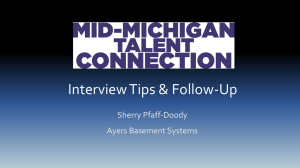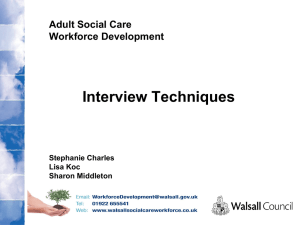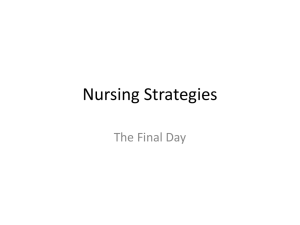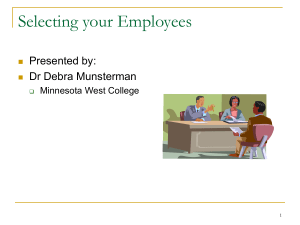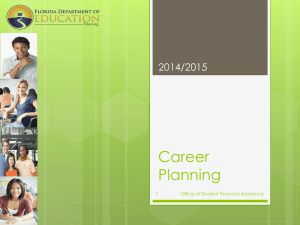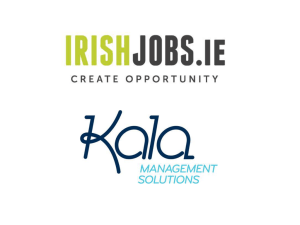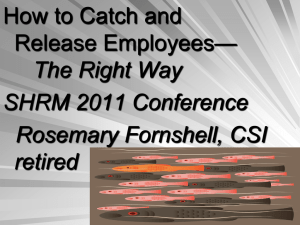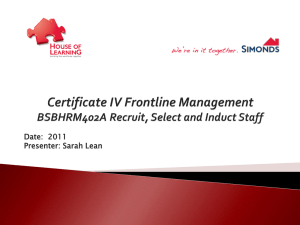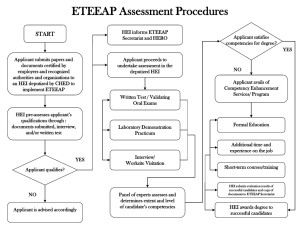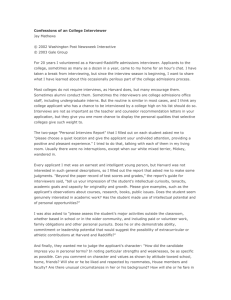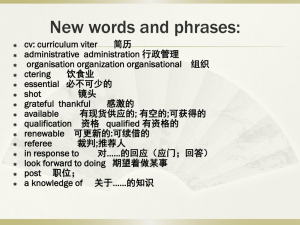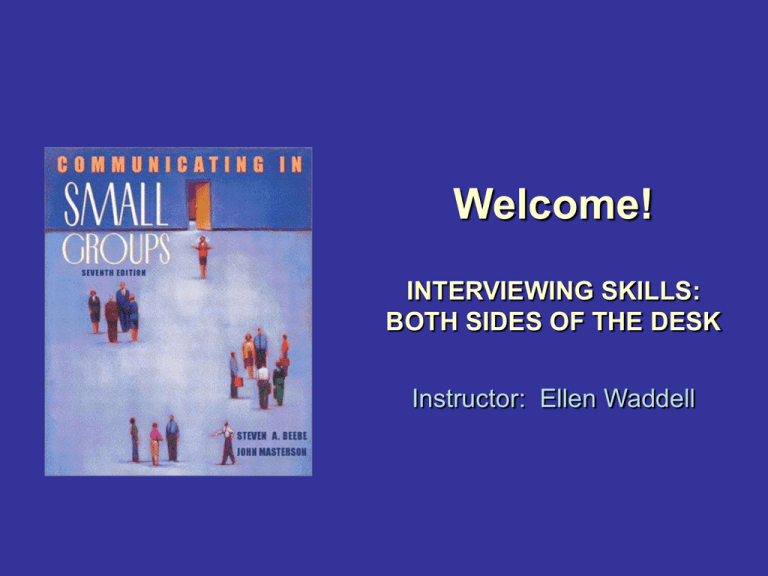
Welcome!
INTERVIEWING SKILLS:
BOTH SIDES OF THE DESK
Instructor: Ellen Waddell
What is an Interview?
• Interview
– Purposeful
– Planned
– Decision-making
– Person-to-person communication
• Designed to achieve specific
objectives
• Interaction should be
structured
• Should ideally be a balanced
exchange
Why is it important?
• People decisions are the
ultimate-the only true control of
an organization
• People determine the
performance capacity of a firm
• No organization can do better
than the people it employs
• Selection of new employees only
STARTS the process of selection
and retention
Why is it important?
• People inhabit the culture and help to create a
productive, or not so productive work environment
• To build a successful organizational culture, you
must start out asking yourself
– Vision
– Values
– Mission
– Organizational structure
– Assignment of duties
• What does the right applicant “look” like?
• FINALLY: Finding those applicants and building your
team
Types of Interviews
Variety of interviewing purposes
Information-Gathering
Appraisal
Persuasive
Exit
Counseling
Hiring
Interview Process Types
Unstructured
Systematic
Haphazard
Causal
procedure
Loosely
organized:
“shooting from
the hip”
-Clear statement of
objectives for the
interview
-Planned ways of
obtaining information
-Flexibility
-Evaluation procedures
Typically
individual
interviewer only
Individual interviewer
or team
Structured
-Same as
Systematic,
except:
-No flexibility
-Team based
Interview Preparation: Cover Letter
a preview of who you are & qualifications
Cover letter
Expresses interest in the position
Tells how you learned of the position
Reviews primary skills and accomplishments
Explains why these qualify you for the job
Highlights any items of special interest that are relevant
Contains a request for an interview
Interview Preparation: Resume
Resume – detailed summary of abilities and
accomplishments, typically including:
Contact information
Job objective
Employment history
Education
Relevant professional certifications and affiliations
Community service
Special skills and interests relevant to the job
References
Stages of an Interview
Opening
Body
Establish rapport
Explain purpose/scope of meeting
Icebreakers/orientation statements
Work experiences
Educational background, activities, interests
Breadth of knowledge
Ability to manage time
Close
Make the leave-taking comfortable
The Heart of the Interview
Questions
Closed questions
Open questions
choice and scope of answer broader
Primary questions
Highly structured with yes or no answers
introduce topics
explore a new area
Secondary questions
Probing questions
follow up primary questions
Ask for an explanation
Roles and Responsibilities
Interviewer’s goals
Information seeker
Information Giver
Decision Maker
Interviewees’ goals
Research the organization
anticipate questions
Plan to ask questions themselves
Types of Employment Interviews
Behavioral
Case
interview
interview
Stress
interview
Panel interview
Rapid questioning
Psychological
Emotional stability
The Job Applicant
Manage the initial impression
Key tools
What you say
How you say it
Nonverbal cues
Maintain comfortable eye contact
Vary pitch and volume
Eliminate hesitations
Lean forward from the trunk
Don’t slumping
Communicate a high level of energy
Smiles; hand gestures; appropriate body movements
The Interviewer
The interviewer must
Maintain control of the interchange
Deliver information clearly
Listen (facts and feelings)
Build trust
Distinguish relevant from irrelevant information
Nonverbal cues
Three- to six-second silences
“mm-hmm”
Diversity and the Interview
Culture could influence how we conduct ourselves
in an interview
Those from individualist societies may seem arrogant
in collectivist societies
Western culture encourages assertiveness and
showcasing of strengths
Those from collectivist societies may seem
unassertive, lacking in confidence and unprepared to
assume leadership in an individualist society
Eastern culture teaches modesty and humility about
personal achievements, qualifications and experience
Technology and the Job Search
Job postings online before in newspapers
Company homepages provide background information
Ability to e-mail cover letter and resume
Company sites also post job openings
Recruitment sites post job openings
Job seeker homepages
Electronic resumes
Computer-assisted interviews
Looking at the Law
Can you ask:
Name of the next of kin?
Political party applicant favors?
What foreign languages the applicant
speaks?
Whether an applicant has a permanent
visa?
Looking at the Law
Are these advertisements legal?
Receptionist: if you’re a cutie you like this duty
Management trainees- college degree-top 10%
of class only
Accountant- Must be over 45 years of age
Human Resource Recruiter: experience
recruiting at African American colleges
Sales- recent college graduate preferred
Looking at the Law
Which of the following are illegal
Companies may give tests to applicants to measure intelligence
or personality providing the publisher of the test vouches the test
is non-discriminatory
A company can refuse to employ an applicant because he is over
age 70
A company can refuse to employ an applicant because she is
pregnant
A company may ask a woman applicant if she has small children
at home
Looking at the Law
Which of the following are illegal
Companies may give tests to applicants to measure intelligence
or personality providing the publisher of the test vouches the
test is non-discriminatory
A company can advertise for someone “at least 21”
A company can refuse to employ an applicant because she is
pregnant
A company may ask a woman applicant if she has small
children at home
A company can specify a male only, due to excessive travel
required of the position
Looking at the Law
Which of the following are illegal
The company can specify English speaking skills, since its
clientele are all English only speaking
The company can specify it wishes an attractive woman to greet
customers and visitors
A minority applicant must be given first consideration for a
promotion even though less qualified than other candidates
Companies employing more women than men need not have
Affirmative Action Plan to recruit more women
Looking at the Law
Equal Employment Opportunity Commission (EEOC)
Criteria that are legally irrelevant to job qualifications are
considered discriminatory
Illegal questions are those regarding:
Race
Ethnicity
Marital status
Age
Sex
Disability
Arrest record
Increase Your Interview Effectiveness
Be prepared
Practice sending and receiving messages
Demonstrate effective listening skills
Have conviction
Be flexible
Be observant
Consider the offer
Chart your progress
Employee Selection:
Meyers Briggs Personality Profile
What might the personality profile be of:
•
•
•
•
•
•
•
•
The CEO
The Marketing VP
The Chief Financial Officer
The Receptionist
The Administrative Assistant
The Web Master
The Accounting Clerk
The Human Resources Manager
Employee Selection:
Meyers Briggs Personality Profile
•
•
•
•
•
The CEO
The Marketing VP
The Chief Financial Officer
The Receptionist
The Administrative
Assistant
• The Web Master
• The Accounting Clerk
• The Human Resources
Manager
• Note to lecturer:
– See secret slide
End of Presentation


